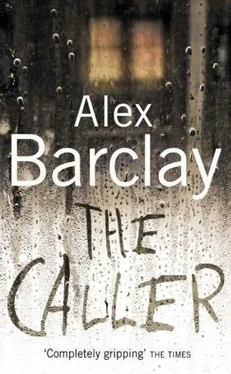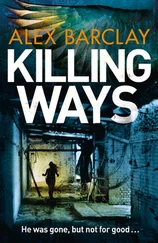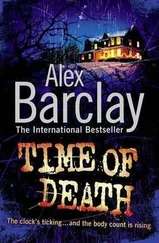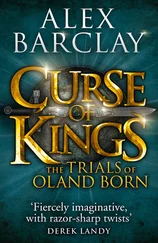Alex Barclay - The Caller
Здесь есть возможность читать онлайн «Alex Barclay - The Caller» — ознакомительный отрывок электронной книги совершенно бесплатно, а после прочтения отрывка купить полную версию. В некоторых случаях можно слушать аудио, скачать через торрент в формате fb2 и присутствует краткое содержание. Жанр: Полицейский детектив, на английском языке. Описание произведения, (предисловие) а так же отзывы посетителей доступны на портале библиотеки ЛибКат.
- Название:The Caller
- Автор:
- Жанр:
- Год:неизвестен
- ISBN:нет данных
- Рейтинг книги:4 / 5. Голосов: 1
-
Избранное:Добавить в избранное
- Отзывы:
-
Ваша оценка:
- 80
- 1
- 2
- 3
- 4
- 5
The Caller: краткое содержание, описание и аннотация
Предлагаем к чтению аннотацию, описание, краткое содержание или предисловие (зависит от того, что написал сам автор книги «The Caller»). Если вы не нашли необходимую информацию о книге — напишите в комментариях, мы постараемся отыскать её.
The Caller — читать онлайн ознакомительный отрывок
Ниже представлен текст книги, разбитый по страницам. Система сохранения места последней прочитанной страницы, позволяет с удобством читать онлайн бесплатно книгу «The Caller», без необходимости каждый раз заново искать на чём Вы остановились. Поставьте закладку, и сможете в любой момент перейти на страницу, на которой закончили чтение.
Интервал:
Закладка:
In 1992, Madeline Colt and Julia Embry came together at The Mount Sinai Hospital of Queens to watch their teenage sons paint. Separately, they had turned away and walked crying into the hallway outside.
‘My son used to hike,’ said Madeline.
‘Robin made us laugh so much,’ said Julia. They had both looked back at their sons, one with the easel lowered to the level of his wheelchair, the other having his brush guided around the page by a nurse. The women looked at each other and smiled.
‘But they’re here,’ said Julia.
‘They are,’ said Madeline. ‘We’re blessed.’
Ten years of campaigning and fundraising later, the Colt-Embry Rehabilitation Clinic was founded to support patients with traumatic brain injuries. It sat on a one-acre site between 19th and 21st Street in Astoria. Tucked into the north-east corner were the Colt-Embry Homes, a small block of twenty apartments to ease the transition for patients from rehab to home.
Julia Embry sat at her desk, pressing a Kleenex carefully under her eyes to catch the tears before her mascara did. She held a photo of Robin in her hands. It was taken at his eighth birthday party. He was wearing a huge black pirate’s hat and a white shirt with a red kerchief tied around his neck. An eye patch was beside his plate, a glass of orange beside that. His chin was so far forward and he was grinning so wide, that he almost didn’t look like himself. But what Julia loved about it was just how happy he looked, how bright those eyes were, how gentle the little blond boy looked as a fearsome pirate.
The last time she had a visit from two detectives, it was to tell her about Robin’s car accident.
He was seventeen years old when the car he was driving was involved in a crash and the other driver left the scene. Robin was rushed to the hospital where his bones were repaired and his wounds eventually healed. But his brain injury was too severe and after hanging on for a year in rehab, he died. The police never caught the driver.
There was a knock on the door.
‘Come in,’ said Julia, putting the photo back on the desk facing her. She stood up.
‘I’m so sorry about all this, detectives,’ she said. ‘Please, sit down.’
Joe and Danny introduced themselves and took a seat.
‘Firstly,’ said Julia. ‘I really would like to reassure you about Stanley Frayte, for what it’s worth. He’s worked with me for so long now. He’s the best. He really is. He was trying to do the right thing by Mary. But, you know, he doesn’t know everything about everyone. He’s been with the clinic and me for ten years, but he’s only been working here in the apartment building several weeks, so…’ She smiled. ‘Poor Stan.’
‘We’d like to talk to you about Mary Burig,’ said Joe.
‘OK,’ said Julia. ‘What would you like to know?’
‘Let’s start with how she came to be here,’ said Joe.
‘Mary was found last year, wandering the street three blocks from her apartment. When they got her to hospital, doctors discovered the TBI. She had no recollection of what happened to her.’
‘So Mary has never spoken about her accident.’
Julia shook her head. ‘No. She can’t remember it. It’s not uncommon. It’s kind of like the brain’s defence mechanism.’
‘Can you talk us through her, uh, situation, condition…’ said Joe.
‘First of all, Mary is a person… who suffered a traumatic brain injury.’
‘I understand,’ said Joe.
‘Not a brain injury sufferer.’
Joe nodded.
‘So Mary as she was before – what we call pre-morbidly – is still there, but she’s got a new set of behaviours. Every program is individual here. This is Mary’s.’ She handed a copy to each of them. Joe flicked through twelve pages on Mary’s treatment and details of how each one would help her. He paused at psychiatric. Impairment: brain injury. Function: emotional regularity. Participation: inability to regulate emotions/thoughts.
Joe looked up. ‘Let’s say Mary can make sense of these letters-’
‘She might not,’ said Julia. ‘She might not remember writing them at all.’
‘OK, but let’s say she does. Can we believe what she is saying to us?’
‘I would say so. Yes. If you can decipher it.’
Danny looked up from his notebook. ‘How do you think her injury might have happened?’
‘Her medical records are confidential, as you can appreciate. Unless Mary gives you permission to access them. Or her guardian does.’
‘Who’s her guardian?’
‘Her older brother, David Burig.’
‘We’ll get his details from you, if that’s OK,’ said Joe.
‘Sure,’ said Julia. ‘Mary’s lucky to have David. There’s not a lot of support out there for people with a TBI. Places like Colt-Embry are not common. Most of the time, people are released from hospital into rehab and after that, they’re on their own, back home expected to function as they did before. It’s crazy. And a lot of people are not covered to stay in a place like this. If they don’t have the right insurance, they better have a wealthy family. Can you imagine? Just to be able to live normally? It’s crazy. And because a lot of people physically look the same as they did before the injury, people expect them to act “normally” and when they don’t, they can’t handle it. It’s a very hard thing for everyone to have to adjust to.’
‘How does Mary’s injury affect her, like day to day?’ said Joe.
‘Mary suffered right temporal lobe damage. The temporal lobe is all about memory, emotional stability, reading social cues – crucial parts of everyday life,’ said Julia. ‘Someone who’s had the right side damaged, like Mary, would have problems interpreting facial expressions, so would find it hard to know if you’re angry, sad, etc. Also there would be tone-of-voice issues – their own speech patterns are quite flat and also, they won’t recognize, for example, sarcasm in your tone. They’re not great with humor. Anything non-verbal: faces, music, shapes – she’ll have a problem with. A lot of Mary’s long-term memory is intact. Her short-term memory is where she has difficulties. For example, she may remember someone visiting her apartment this morning, but she may not remember why.’
‘What about all her writing?’ said Joe.
‘That’s because she has temporal lobe epilepsy and what can go along with that is hypergraphia. Basically, she is compelled to write. She can’t help herself. The length of what she writes can vary, so can the quality. Dostoevsky was hypergraphic. Poe was. And Lewis Carroll – you know Alice in Wonderland? Apparently the inspiration came from what happens in the aura part of a seizure when objects will seem to be getting bigger or smaller. You can go into Mary’s room and find her writings everywhere. She likes fancy notepaper, so she’s got stacks of that. She’s written on toilet paper, the back of receipts, cereal boxes, even the wall once.’ She smiled.
‘Do you read what she writes?’
‘No. Just because Mary has a brain injury doesn’t mean we can all waltz right in there and invade her privacy. She has an apartment, it’s her space, what she does there is her business. I mean, within reason. Obviously, we need to keep an eye on things.’
‘Why do you think she’s writing to us?’
‘I don’t know. You can ask Mary. I told her you were coming in. It really distressed her, just so you know. She’s been a little at sea, because her TSS was away.’
‘TSS?’ said Joe.
‘Sorry – that’s Therapeutic Support Staff. Her name is Magda Oleszak, but she’s been on vacation. Someone else was filling in, which always unsettles Mary.’
‘OK,’ said Joe. ‘We’ll bear that in mind. Back to why Mary got in contact with us…’
Читать дальшеИнтервал:
Закладка:
Похожие книги на «The Caller»
Представляем Вашему вниманию похожие книги на «The Caller» списком для выбора. Мы отобрали схожую по названию и смыслу литературу в надежде предоставить читателям больше вариантов отыскать новые, интересные, ещё непрочитанные произведения.
Обсуждение, отзывы о книге «The Caller» и просто собственные мнения читателей. Оставьте ваши комментарии, напишите, что Вы думаете о произведении, его смысле или главных героях. Укажите что конкретно понравилось, а что нет, и почему Вы так считаете.












